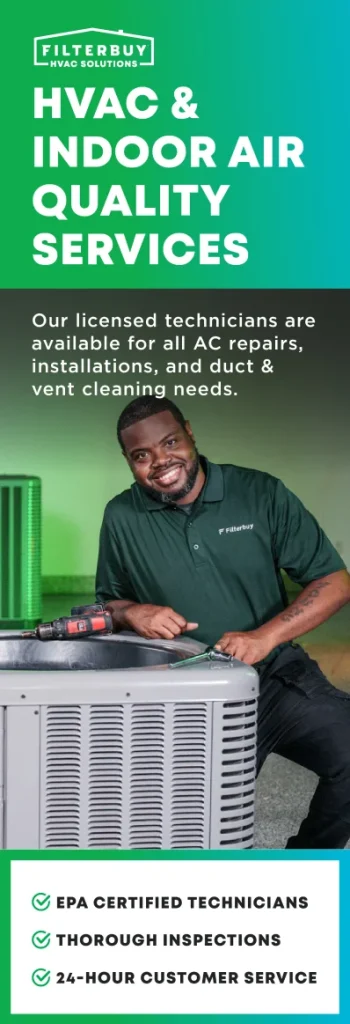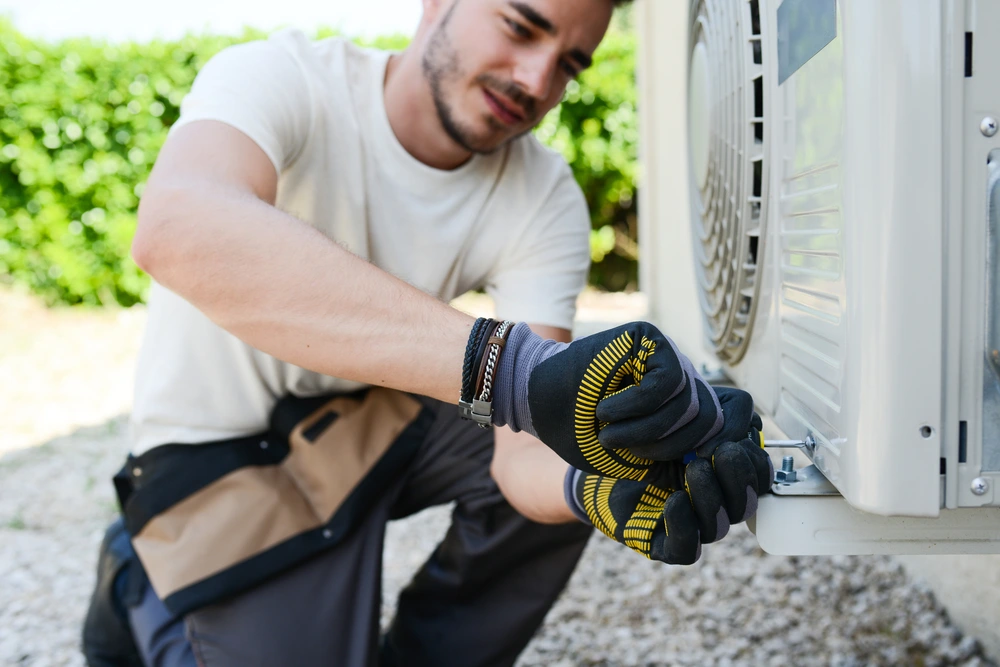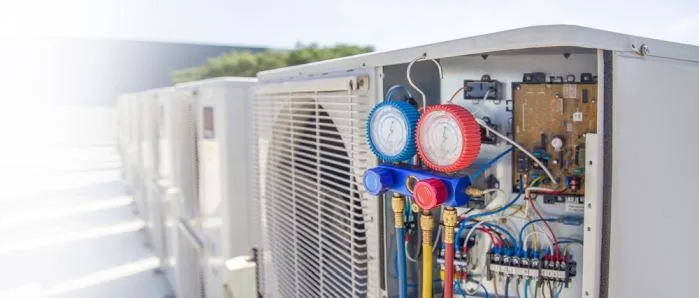Sudden breakdowns occur due to spring weather that’s putting extra strain on your HVAC. This spring air conditioning maintenance guide shares proven tips and strategies you can trust. It’s an HVAC maintenance checklist designed to help homeowners and business owners save money, improve efficiency, and extend equipment lifespan.
From simple filter changes to expert-level maintenance tasks, these steps will keep your HVAC in top condition. Take control of your comfort this season. Follow our spring HVAC maintenance tips. And keep your home running efficiently all year long.
Top Takeaways
- Regular maintenance is cost-cutting. Stops expensive repairs, increases lifespan, and reduces energy expenses..
- Neglecting maintenance causes breakdowns. System failures happen because of clogged filters and refrigerant leaks.
- 80% of failures are avoided through professional tune-ups. HVAC service checks catch issues before they become costly.
- Act now for a worry-free season. Follow our AC spring maintenance guide and schedule for a professional HVAC tune-up.
- 24/7 support adds peace of mind. With Filterbuy HVAC Solutions, expert help is always available when you need it most.
Why Spring HVAC Maintenance Is Necessary
Spring is the ideal moment to provide your HVAC with the care it requires. Your unit works harder to keep pace as temperatures transition from cool to warm.
Spring maintenance also enhances indoor comfort. This has a huge impact on allergy or asthma-prone families.
Having professionals like Filterbuy HVAC Solutions by your side guarantees your HVAC receives the skilled attention it needs.
Maintenance Tips and Checklist From an Expert
Regular maintenance keeps you out of the hole of higher energy bills, bad indoor air quality, and surprise breakdowns on hot summer days.
We’ve put together an HVAC spring checklist with easy maintenance tips and pro secrets.
Spring HVAC Maintenance Tips
- Change air filters – Replace filters every 60-90 days. More frequently if you’ve got pets or allergies. This increases airflow and indoor air quality.
- Check thermostat settings – Ensure your thermostat is in good working condition for energy saving.
- Clean vents and registers – Vacuum and dust them. This is to ensure air is flowing freely.
- Inspect outdoor unit – Remove leaves, dirt, and debris around the condenser. This avoids airflow restrictions.
- Check refrigerant levels – Cooling capacity lowers when there is low refrigerant.
Expert HVAC Checklist
Experts recommend the following for a deeper and more professional level of inspection:
- Clean evaporator and condenser coils – Dirty coils make your HVAC work harder.
- Check ductwork – Monitor for duct leaks or blockages. This wastes energy and diminishes comfort.
- Lubricate moving parts – Avoids motor and fan wear and tear.
- Test electrical connections – Loose wires cause unsafe operation or HVAC failure.
- Check safety controls – Ensures your unit runs reliably without risks.
Why Professional HVAC Maintenance Always Pays Off
Routine maintenance is important for HVAC to work optimally. Professional HVAC service does so much more, and the payoff always exceeds the investment.
Lower Energy Bills. Less energy is spent, which means lower monthly bills. Smooth and efficient system running.
Fewer Breakdowns. Skipping maintenance turns small problems into major and expensive repairs. Technicians spot issues early before they lead to a breakdown. This preventive maintenance saves you from stress and money.
Longer System Lifespan. An HVAC unit is a big investment. Regular professional HVAC service keeps all parts working smoothly. This also extends the life of your equipment. The longer your unit lasts, the more value you get out of it.
Better Indoor Air Quality. Professional cleaning removes bad particles. This helps your family breathe easier, especially during allergy season.
24/7 Peace of Mind. Professional maintenance isn’t just about performance. It’s about comfort and safety. Companies like Filterbuy HVAC Solutions offer 24/7 service. So you know, expert help is always available when you need it.
Investing in expert care now means fewer headaches and lower costs later. For dependable, year-round comfort. Trust Filterbuy HVAC Solutions to keep your system in peak condition.
Supporting Statistics
Here’s what the numbers and industry experience reveal:
- Energy Consumption & Efficiency
- Heating & cooling make up nearly 50% of home energy use
- Poorly maintained systems lose 15–20% efficiency, increasing energy costs
- Simple fixes like clean filters and proper calibration reduce energy waste
Source: RPSC Energy
- Repair & Replacement Costs
- $14 billion is spent annually on HVAC repairs & replacements
- Most expensive failures—compressor burnout, refrigerant leaks, clogged coils—are preventable
- $150 tune-ups can prevent $2,500 emergency repairs
Source: RPSC Energy
- HVAC Lifespan and Reliability
- Well maintained HVAC last 15 to 20 years
- Neglected units fail in under 10 years. This leads to early replacements
- Regular service reduces strain on key components, preventing premature wear
Source: ASHRAE
Filterbuy HVAC Solutions’ comprehensive tune-up service includes a 24-point inspection, an AC Report Card, and the peace of mind that comes with knowing your system is prepared for any season!
Frequently Asked Questions:
How to prepare your residential HVAC system for spring?
- Clean or replace air filters
- Inspect and clean coils
- Check refrigerant levels
- Clear debris around the unit
- Test the thermostat for proper function
What’s in an AC unit spring maintenance checklist when servicing?
- Clean coils
- Check refrigerant levels
- Test electrical connections
- Lubricate moving parts
- Clear drain lines
- Calibrate the thermostat
What is the average cost of a spring AC tune-up?
A spring AC tune-up costs between $75 and $200. Depending on the location and service provider.
Can you do DIY HVAC maintenance?
Basic tasks like changing filters and clearing debris are manageable. But professional servicing is recommended for thorough inspections and tune-ups.
What are the best HVAC settings for spring?
Set the thermostat to cooling mode. Adjust the temperature to a comfortable level around 72-75°F. Use auto fan mode for efficiency.
What temperature should I set my AC to in the spring?
Set the AC to around 72-75°F for cooling. And use auto mode to optimize energy efficiency and comfort.
How frequently should I schedule preventative maintenance for my HVAC?
At least twice a year. Ideally, in the spring for cooling and fall for heating.
What kind of maintenance does an HVAC system require?
- regular filter changes
- coil cleaning, refrigerant checks
- thermostat calibration
- drain line clearing
- inspecting electrical components
What exactly is a pre-season HVAC tune-up?
A comprehensive inspection and servicing of your HVAC before peak usage seasons to ensure efficiency and prevent breakdowns.
Is a fresh air intake necessary for my HVAC?
Yes. It helps improve indoor air quality by bringing in fresh outdoor air and reducing pollutants.
What’s the best time of year to schedule my HVAC tune-up?
Schedule it in early spring before temperatures rise. This is to ensure your HVAC runs efficiently in the summer.
Why do I need air conditioner spring maintenance?
Spring maintenance is essential to ensure your AC is ready for the summer heat. This preventive service helps improve efficiency, lower energy bills, and catch small issues before they turn into expensive breakdowns.
What to do when the furnace goes out in winter?
Check a few basics:
- Make sure the thermostat is set to “heat.”
- And the fan is on “auto.”
- Check your home’s circuit breaker to see if a fuse has been tripped.
If the furnace still isn’t working, immediately contact a professional HVAC technician.
What’s the best HVAC system for allergies?
While many factors play a role, the best HVAC for allergies is one with an effective air filtration system. A unit that can accommodate a high MERV filter is ideal. These filters can trap tiny particles like pollen, dust mites, and pet dander.
How often should I have the coils of my air conditioning or heat pump system cleaned?
At least once a year. Preferably during seasonal maintenance. This is to maintain efficiency and airflow.







